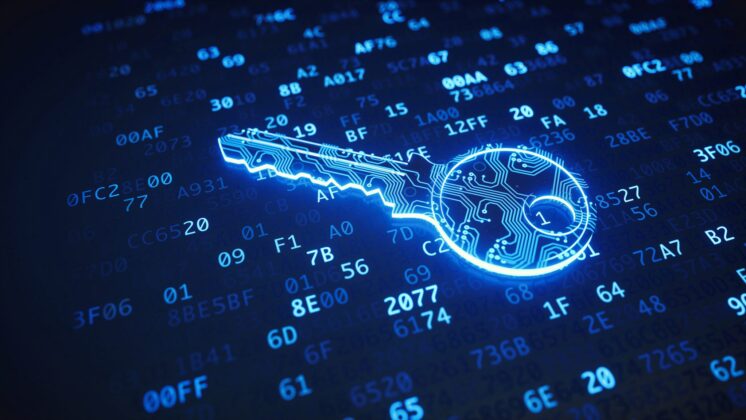On my way home from a recent business trip, I had a slight panic attack: did I have my house key? My wife would be out by the time I got home. I had no other way of getting in.
I reached into my pocket and touched the metal object, letting out a sigh of relief. At the same time, I wondered why, in 2019, I was still so reliant on objects even the Egyptians used millennia ago.
In an age where you can unlock your iPhone using facial features, your Tesla trunk with your smartphone, or apps using your voice and a little help from Amazon’s Alexa, why do traditional keys still exist? Are there any alternatives I’m missing out on? Will my kids, who will enter the workforce in 2040, still carry around these worrisome pieces of metal, or will they be using unlocking technologies just entering their infancy today?
After doing a little research and challenging my own imagination, I’m proud to present a few predictions for the future of keys in 2040!

Smart locks will become the norm
Most people have encountered smart locks in one form or another, whether it’s an electronic key card to enter a hotel room, a keypad to enter an office building, or a fingerprint scanner to unlock a laptop. Smart locks are electromechanical locks that receive information based on programmed authentication. They are configurable, always connected, and can in some cases keep track of who entered or exited a particular location.
Thanks to smartphones allowing connections via Bluetooth and WiFi, an explosion of smart lock providers, and decreasing production costs, setting up a smart lock at home is becoming a popular choice for securing valuables and protecting loved ones.
The market for smart locks is already seeing impressive growth. Market forecasts for 2024 have reached $2.48 billion USD, compared to today’s $1.95 billion USD. Major growth regions include North America, Europe, and APAC nations such as China, Japan, and Korea. Most growth will likely come from individual homeowners and the commercial segment covering the hospitality industry, government and office buildings. This shouldn’t come as a surprise, given the already increasing demand for smarter homes and cities, which rely on more affordable, secure solutions to fit the 4th Industrial Revolution.

Human bodies will serve as master keys
Science fiction has long enjoyed the theory of microchips storing secret information. Today, the science of implanting technology into our skin isn’t so far fetched. In fact, thousands of people in Sweden have turned to microchips that can be implanted in hands or other areas of the body. These chips not only open doors, but also allow users to carry personal data everywhere they go.
If this is too invasive for you, good news: decades ago, to ensure higher levels of security and reliability, locksmiths started taking note of the unique features of our bodies that hold the potential to open up locks. Our faces, eyes, fingers, and voices are still used as keys, now fitting security systems that never stopped evolving.
Newer models of biometric scanners are able to distinguish the unique pores of our skin, retina scanners can recognize the blood vessels in our eyes, and some systems can even identify DNA sequences. Recently, researchers have also been developing methods to read characteristic body movements and brain waves. Imagine: someday, having your favorite song stuck in your head could unlock your bank account. Now that’s a hard PIN to copy!

Thieves will find a way . . . but so will security companies
History has taught us that, no matter how advanced locking technologies become, thieves will always rise to the challenge. It comes as no surprise that the development of locks has been largely an arms race between lock makers and lock pickers. This will most likely continue into the age of smart locks.
Modern luxury cars with high-end security are vulnerable to thieves with receivers standing just outside in the driveway. Face ID can be fooled with 3D-printed heads, and fingerprint scanners are easily tricked by a digital camera and a little glue.
Thieves are also adept at abusing weak points in the mechanism of locks. That expensive smart lock you bought for your bike that promised high-end security? People have already figured out how to disassemble it in a matter of minutes.
Luckily, technological developments have boosted systems that could help deter those who manage to bypass smart locks. That thief about to rob your house might already have been spotted by high-end security cameras and scanners that, even today, are becoming widely available at low cost around the world.
With China taking the lead in tracking and scoring the behavior of its citizens, committing a common theft like breaking in or stealing a bike might soon be history. Of course some nations may face public outcry and need to find other methods that can prevent theft while respecting individual rights and privacy.

Physical keys will still exist
There are plenty of reasons many of us still carry around traditional keys. One is simple architecture: most residences around the world were built in the past century. Even those that were built more recently have kept to the traditional lock model to save on costs. Replacing all those locks and keys would call for significant switching costs. Surely, we will eventually see a steep rise in households calling for smart locks, given their dropping prices, stronger reliability, and security. However, depending on where you live, that might take a few more decades.
Setting the architectural legacy aside, no one wants to come home to a door that cannot be unlocked due to connectivity issues, battery life, system failure, or any other type of IT glitch. Durable, physical keys still offer peace of mind and few surprises.
Even tech giants recognize the continuing need for physical keys. Google’s Titan security key, as part of a two-factor authentication process, has prevented 85,000 Google employees from phishing scams. By pushing a button on the security key, you can let devices know you are the actual owner. This system is similar to how our smartphones act as physical keys when we’re given SMS codes or are called by a robot to verify our identity.
Where does that leave us?
So will 2040 be the heyday of a keyless society? Depending on your region and the mindset of your society and government, it may well be. Here in Japan, my sons may not be opening doors with their brainwaves, but they’ll most likely be coming home to smart locks, be it on our front door, bicycles, or car.
At the same time, physical keys will probably still be around, whether due to legacy, cost-effectiveness, or simply that extra layer of protection. I guess I’ll need to keep checking my pockets to make sure I’ve got it on my next business trip!



